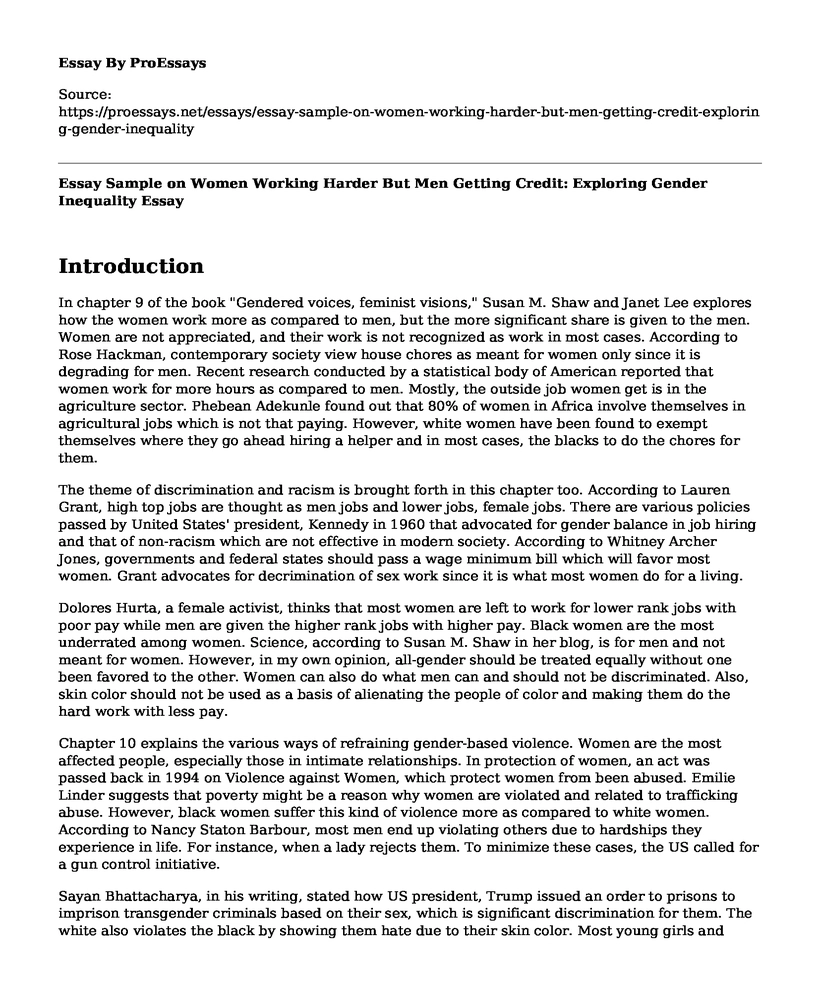Introduction
In chapter 9 of the book "Gendered voices, feminist visions," Susan M. Shaw and Janet Lee explores how the women work more as compared to men, but the more significant share is given to the men. Women are not appreciated, and their work is not recognized as work in most cases. According to Rose Hackman, contemporary society view house chores as meant for women only since it is degrading for men. Recent research conducted by a statistical body of American reported that women work for more hours as compared to men. Mostly, the outside job women get is in the agriculture sector. Phebean Adekunle found out that 80% of women in Africa involve themselves in agricultural jobs which is not that paying. However, white women have been found to exempt themselves where they go ahead hiring a helper and in most cases, the blacks to do the chores for them.
The theme of discrimination and racism is brought forth in this chapter too. According to Lauren Grant, high top jobs are thought as men jobs and lower jobs, female jobs. There are various policies passed by United States' president, Kennedy in 1960 that advocated for gender balance in job hiring and that of non-racism which are not effective in modern society. According to Whitney Archer Jones, governments and federal states should pass a wage minimum bill which will favor most women. Grant advocates for decrimination of sex work since it is what most women do for a living.
Dolores Hurta, a female activist, thinks that most women are left to work for lower rank jobs with poor pay while men are given the higher rank jobs with higher pay. Black women are the most underrated among women. Science, according to Susan M. Shaw in her blog, is for men and not meant for women. However, in my own opinion, all-gender should be treated equally without one been favored to the other. Women can also do what men can and should not be discriminated. Also, skin color should not be used as a basis of alienating the people of color and making them do the hard work with less pay.
Chapter 10 explains the various ways of refraining gender-based violence. Women are the most affected people, especially those in intimate relationships. In protection of women, an act was passed back in 1994 on Violence against Women, which protect women from been abused. Emilie Linder suggests that poverty might be a reason why women are violated and related to trafficking abuse. However, black women suffer this kind of violence more as compared to white women. According to Nancy Staton Barbour, most men end up violating others due to hardships they experience in life. For instance, when a lady rejects them. To minimize these cases, the US called for a gun control initiative.
Sayan Bhattacharya, in his writing, stated how US president, Trump issued an order to prisons to imprison transgender criminals based on their sex, which is significant discrimination for them. The white also violates the black by showing them hate due to their skin color. Most young girls and women are vulnerable to rape and sexual assault. The men take advantage of them being weak and harass them sexually. To help curb the issue of racism in the US, the blacks organized a conference among them and decided to fight against racism.
Conclusion
In conclusion, women need to be empowered, and the government needs to pass various laws that fight against human trafficking to help curb these issues that are found to affect women. The white should also be urged to stop discriminating the white based on their skin color since by doing that they will be promoting peace and unity among them.
Works Cited
Boyd, Melinda Jean. Gendered Voices: The Liebesfruhling Lieder of Robert and Clara Schumann. Diss. University of British Columbia, 1996. Retrieved from open.library.ubc.ca/collections/831/831/items/1.0099061
Brannon, Linda. Gender: psychological perspectives. Routledge, 2016. Retrieved from content.taylorfrancis.com/books/download?dac=C2015-0-66959-4&isbn=9781317221111&format=googlePreviewPdf
Bennett, Susan. Performing Nostalgia: Shifting Shakespeare and the contemporary past. Routledge, 2013.Retrieved from www.taylorfrancis.com/books/9781315003085
Fulkerson, Mary McClintock, and Sheila Briggs, eds. The Oxford handbook of feminist theology. Oxford University Press, 2012. Retrieved from books.google.com/books?hl=en&lr=&id=_aBxZRMUHw0C&oi=fnd&pg=PP1&dq=endered+Voices,+Feminist+Visions++Classic+and+Contemporary+Readings++Seventh+edition++Susan+M.+Shaw+and+Janet+Lee&ots=uBrVmiKq5o&sig=gyLpm4kNM1b2rbtdEgf-HxI7JJU
Cite this page
Essay Sample on Women Working Harder But Men Getting Credit: Exploring Gender Inequality. (2023, Feb 12). Retrieved from https://proessays.net/essays/essay-sample-on-women-working-harder-but-men-getting-credit-exploring-gender-inequality
If you are the original author of this essay and no longer wish to have it published on the ProEssays website, please click below to request its removal:
- Research Paper on Counterculture Movement
- Sociological Aspects of Poverty Prevention Essay Example
- UN Outlines Human Rights For Health Care of Offenders - Essay Sample
- Essay Example on Gender Discrimination In Tourism: A Key Challenge for Managers
- Biography Sample on Jane Addams: Champion of Peace, Philanthropy, Work Ethic
- Free Report Example on 1 in 134 Women at Risk of Cervical Cancer: Get Screened Now
- Paper Sample on Childhood Obesity: A Growing Problem in US Schools







